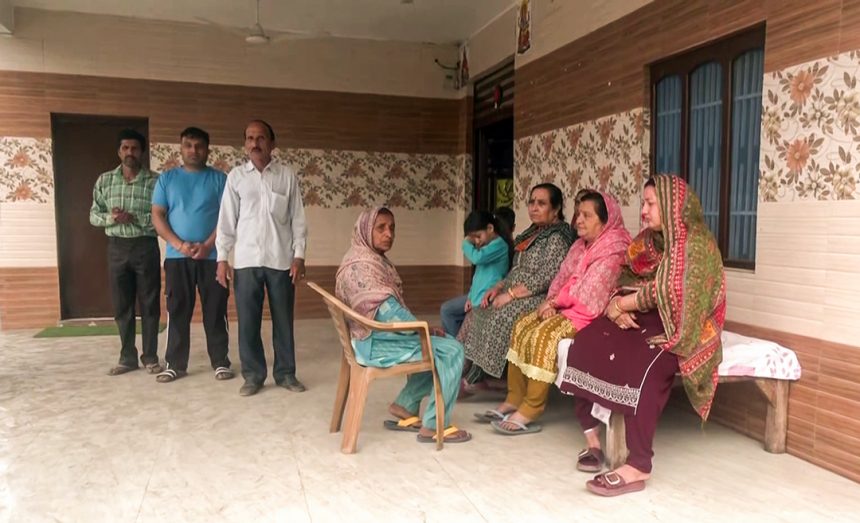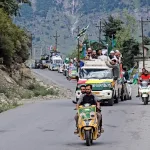Rajouri, May 18: Following the understanding of the cessation of hostilities between India and Pakistan on May 10, life is gradually returning to normal in the Rajouri district of Jammu and Kashmir. Although caution and fear persist, locals have started reopening shops and resuming daily routines.
Residents of Rajouri, who faced immense hardships due to intense cross-border shelling, are slowly stepping back into everyday life.
Speaking to ANI, Neeras Sin, a local hotel worker, said, “When the shelling started, we closed our shops and went home. Even now, we shut shops by 4 or 5 pm and return early in the morning. Earlier, we used to open around noon, and customers would come in regularly, but footfall is still very low.”
He added that although there is some activity in the market, a sense of fear continues to linger. “Schools and madrasas are still closed. Children have been sent back from the madrasas. The market is not yet back to normal,” he said.
Another resident, Khalilur Rahman, mentioned that while the cessation of hostilities between India and Pakistan has brought some relief, uncertainty still lingers. “Shops have opened, and essential goods are being bought, but people are still scared. There’s hope that if the atmosphere remains peaceful, normalcy will fully return.”
He further added that while the situation has improved, financial strain is a major concern. “Middle-class families who earn and eat daily are struggling. For such people, this kind of instability is very difficult. “In times of shelling, everything collapses. For people who earn during the day and eat at night, survival becomes very hard,” he added.
An 85-year-old resident from the border area of Rajouri shared his emotional appeal for peace. “I have lived through the wars of 1947, 1965, and 1971, but I’ve never seen such terrifying shelling in my lifetime. We just want to live without fear. People have started opening their shops again, but the fear still lingers in our hearts. Labourers have left, work is halted, and children are unable to attend school. Only peace can bring life back to normal here,” he said.
Meanwhile, work remains at a standstill in construction zones. Ravid Ahmed, who works for a company involved in road and bridge construction, told ANI, “When shelling started, workers left. Labourers from outside, including Bihar, haven’t returned yet. Work on the canal bridge is still suspended.”
He added that although only a few shells landed in the area, fear pushed many to leave. “I had gone home too. I’ve returned, but the labourers haven’t. Until they come back, work can’t restart.”
Operation Sindoor was India’s decisive military response to the April 22 Pahalgam terror attack. Launched on May 7, Operation Sindoor led to the death of over 100 terrorists affiliated with terror outfits like the Jaish-e-Mohammed, Lashkar-e-Taiba, and Hizbul Mujahideen.
After the attack, Pakistan retaliated with cross-border shelling across the Line of Control and Jammu and Kashmir as well as attempted drone attacks along the border regions, following which India launched a coordinated attack and damaged radar infrastructure, communication centres, and airfields across 11 airbases in Pakistan.
After this, on May 10, an understanding of the cessation of hostilities between India and Pakistan was announced. (ANI)
AAP MLA visits Poonch, meets victims of Pakistani shelling
Jammu and Kashmir Aam Aadmi Party unit president and MLA from Doda, Mehraj Malik on Sunday visited Poonch district and met the families who were affected in the Pakistan shelling during the heightened India-Pakistan tensions.
Speaking to ANI, Malik criticised the BJP-led Centre, alleging that the victims of the Pakistan shelling have not been compensated yet. He further demanded that the people who lost their lives in Pakistan shelling be accorded the status of “shaheed”
The AAP MLA said, “People who lost their lives in the war have not yet been compensated and people who suffered losses have also not been compensated. We live in a country which is a powerful country… And this has been in going on in Jammu and Kashmir for several years, thousands have lost their lives but they were never given a status of shaheed…”
“Now, they (govt) are not compensating the losses suffered, they are only giving Rs 20,000. When you will see houses which glasses have been damaged are worth lakhs; the shutters of people’s shops are broken, that is worth lakhs. If you cannot stand with the people, then how will the people fight the war,” he added.
Calling the Central government’s policy “ineffective” and “unsuccessful,” the lone AAP MLA of J-K claimed that 900 bunkers built by the Home Ministry are not in good condition.
He said, “I have written a letter to the Union Home Ministry for bunkers. I have clearly written that Rs 415 crores they spent on 900 bunkers are not good. They have not been built in a better way. People who are building tanks inside their houses are better than that. If every house is given Rs 1-2 lakh then people can build a bunker to save their lives. But the government’s policy has always been ineffective and unsuccessful.”
Meanwhile, earlier on Saturday, the Indian Army carried out a door-to-door outreach in villages near the Line of Control (LoC) in Poonch, which were severely affected by recent Pakistani shelling.
As part of the relief efforts, Army jawans distributed essential supplies including medicines and ration to the residents, while also interacted with them to understand their needs.
On May 17, J-K Lieutenant Governor Manoj Sinha said the administration is working on a comprehensive plan to seek centre’s help to rehabilitate residents affected by Pakistan’s shelling.
“Many houses and commercial properties here have been damaged due to the adversarial shelling. Today I visited those places with a senior administrative officer, saw the situation with my own eyes, and interacted with the people to understand their problems… Based on the administration’s assessment, possible immediate assistance has been provided. A few people are left to be rehabilitated. But I think this help is not enough. Divisional Commissioner Kashmir and senior officers will jointly prepare a comprehensive plan for the damage caused. Based on this, we will request the Indian government, and rehabilitate the remaining people,” he said.
Intense shelling by Pakistan during the recent conflict with India has left a trail of destruction in the border villages and districts across the Line of Control (LoC) in Jammu and Kashmir, with locals suffering damages to their houses and livelihood.
Earlier, Jammu and Kashmir Deputy Chief Minister Surinder Choudhary visited border villages near the LoC in Rajouri district and interacted with residents affected by recent hostilities.
The visit followed the ruthless Pakistani shelling in the civilian areas of Jammu and Kashmir post Operation Sindoor, which was conducted on May 7. The operation was conducted in retaliation for the April 22 Pahalgam terror attack that killed 26 people, including a Nepali national.
Meanwhile, the locals residing in the border villages demanded that the government compensate them for the damaged houses. They also urged the Indian government “not to spare Pakistan” for its misadventures.
In the early hours of May 7, the Indian Armed Forces conducted strikes at nine terror hideouts deep inside Pakistan and Pakistan-occupied Kashmir (PoK) under the ‘Operation Sindoor’. (ANI)
Div Com visits shelling hit areas in Mendhar
Divisional Commissioner Jammu Ramesh Kumar today conducted an extensive visit to Sub Division Mendhar to take stock of the situation in areas affected by recent unprovoked cross border shelling. The visit was aimed to assess the damage and ensure timely support to the affected families.
He was accompanied by the Deputy Commissioner Vikas Kundal and other senior officers of the district administration.
During the visit, the Divisional Commissioner inspected several impacted locations and interacted with residents to personally understand their grievances and the extent of losses incurred.
He also visited the residence of the family where a woman lost her life due to the shelling. The Divisional Commissioner expressed deep condolences to the bereaved family and assured them of full support from the administration. He conveyed heartfelt sympathies to all those who have suffered due to the cross border shelling.
The Divisional Commissioner issued directions to the district administration for a comprehensive and time bound assessment of the losses to life, property, and livestock. He emphasized the need for immediate relief and compensation measures to alleviate the suffering of the affected people.
He reiterated the administration’s commitment to standing with the people in this hour of grief and urged the officials on ground to continue working with compassion and urgency to restore normalcy.








